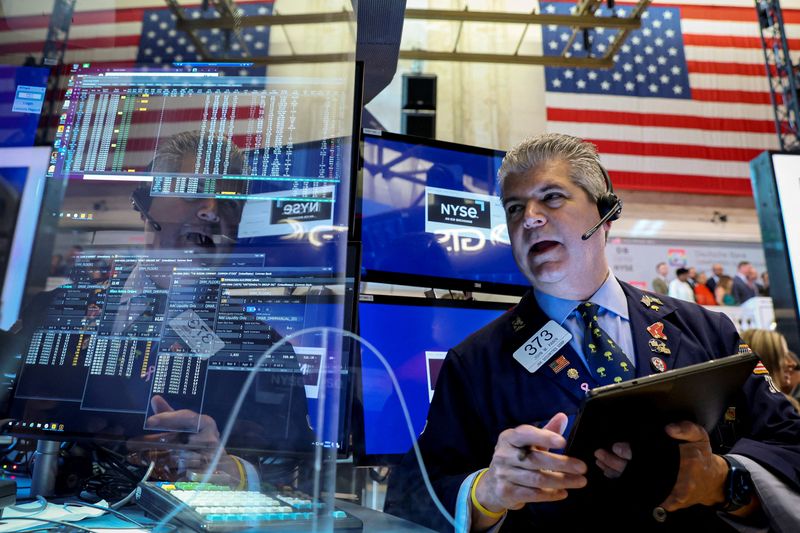By Echo Wang
(Reuters) - Wall Street's main indexes rose on Thursday boosted by a late-afternoon rally and gains in heavyweight growth stocks, including Tesla (NASDAQ:TSLA).
The tech-heavy Nasdaq added 1.4% to lead the gains while the S&P 500 closed at its highest level since June 9. The Dow Jones Industrial Average climbed 0.5%.
Tesla shares surged 9.8% after the electric vehicle maker late on Wednesday posted better-than-expected quarterly results. The gains helped offset a slide in telecom and energy shares, while AT&T Inc (NYSE:T) tumbled, sending telecom shares down after the wireless carrier cut its cash flow forecast saying some subscribers were delaying bill payments. Energy stocks slipped on weak crude prices.
“The earnings picture has been maybe a little better than investors feared," said J. Bryant Evans, investment adviser and portfolio manager at Cozad Asset Management. "We investors are thinking that ..especially technology (sector) has come down too far, and maybe there's some valuation opportunities there.”
Amazon (NASDAQ:AMZN) and Apple (NASDAQ:AAPL) each rose 1.5%, with both companies set to report their earnings on July 28.
The Dow Jones Industrial Average rose 162.06 points, or 0.51%, to 32,036.9, the S&P 500 gained 39.05 points, or 0.99%, to 3,998.95 and the Nasdaq Composite added 161.96 points, or 1.36%, to 12,059.61.
Nine of the 11 major sectors of the S&P 500 closed in positive territory, with consumer discretionary, heath care and information technology posting the biggest gains adding over 1% each.
Falling oil prices hit the S&P 500 energy sector, which tumbled 1.7% to lead declines across the sectors.
Market participants continue to await anxiously for the U.S. Federal Reserve meeting next week where policymakers are expected to raise interest rates by 75 basis points to curb runaway inflation.
Joining its global peers, the European Central Bank delivered a 50 basis points rate hike to tame inflation in its first rate increase since 2011.
The Fed rate decision next week will be followed by the crucial second-quarter U.S. gross domestic product data, which is likely to be negative again.
By one common rule of thumb, two quarters of negative GDP growth would mean the United States is in a recession.
The number of Americans enrolling for unemployment benefits rose to the highest in eight months, the latest data to further fan fears of a recession.
“Consumers are just beginning to react to less money in their pockets, either from reduced overall job market or from rising interest rates and inflation”, Evans added.
“Part of the strong earnings reflects the past strength of consumers, whereas a lot of this broader decline that we've seen .. over the past few months has priced in a slowing in broader economy that eventually would affect consumers.”
Volume on U.S. exchanges was 10.58 billion shares, compared with the 11.63 billion average for the full session over the last 20 trading days.

Advancing issues outnumbered declining ones on the NYSE by a 1.77-to-1 ratio; on Nasdaq, a 1.52-to-1 ratio favored advancers.
The S&P 500 posted 1 new 52-week highs and 29 new lows; the Nasdaq Composite recorded 23 new highs and 46 new lows.